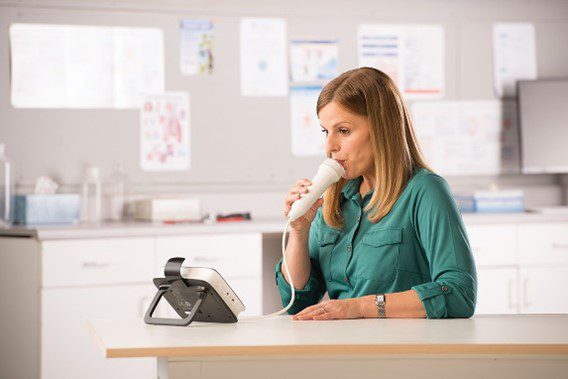More patients are set to benefit from faster and more accurate testing for asthma thanks to a new collaboration between the AHSN Network and NIOX®.
Asthma is a common health condition, affecting more than 5.4 million people in the UK and resulting in 60,000 hospital admissions each year. It has a significant impact on the lives of patients and severe asthma attacks can be potentially life-threatening. However, improvements to asthma care, including access to early diagnosis, treatment and management, can improve outcomes for patients.
The AHSN Network is working with NIOX Group, a provider of respiratory diagnostic and monitoring devices, to improve access to Fractional exhaled Nitric Oxide (FeNO) testing in England, as part of the NHS England Accelerated Access Collaborative Rapid Uptake Products Programme 2021-22, designed to support wider adoption and spread of proven innovations.
FeNO tests measure the amount of nitric oxide in an exhaled breath, with elevated levels indicating a high degree of inflammation in the airways. FeNO testing is a non-invasive, simple process that takes seconds to perform at the point-of-care. Results are almost immediate, enabling faster, more effective diagnosis for those with suspected asthma.
As part of the partnership, NIOX® will provide GPs and Primary Care Networks in England with access to 300 FeNO devices*, increasing access to FeNO testing and enabling more patients to benefit. Local AHSNs will support clinical teams and health systems to integrate FeNO testing into their asthma pathways. Devices are to be distributed across England based on local need, with the goal of reducing respiratory health inequalities through improved access (note – participation remains a locally led decision).
The move follows work already underway by AHSNs to improve the adoption of FeNO testing in primary care through collaboration with local health systems and providing access to implementation toolkits, best practice guidance and resources.
During the first 18 months of this programme, an estimated 146,000 additional patients benefited from FeNO testing across England, resulting from hundreds more FeNO devices entering use in primary care.
Nicola Bent, AHSN FeNO executive lead, Deputy Chief Executive and Director of Innovation Adoption, Wessex AHSN, said: “Historically, FeNO has been widely used in secondary and tertiary care, but there has been limited adoption in primary care. By working with NIOX® and our health and care systems, AHSNs are enabling more people to access FeNO testing in their local communities, helping to reduce underlying health inequalities and improve the lives of asthma patients.”
Dr Andrew Whittamore, GP, Clinical Lead Asthma and Lung UK, and joint FeNO national clinical lead, said: “FeNO helps to inform clinical decision making and enables more people to get the right treatment and care for their condition. The test is quick, easy to do, and gives a result in seconds, supporting conversations with patients about their care. It is fantastic that this collaboration will enable more patients to benefit from FeNO.”
Warren Sweeting, Regional VP EMEA for NIOX Group, said: “We are delighted to support this initiative. NIOX® provides accurate, reliable and straightforward FeNO testing technology that is already trusted by thousands of healthcare professionals to help diagnose and manage asthma. The collaboration with the AHSN Network moves forward on our commitment to ensuring that as many people as possible have access to this important service.”
Find out more about how the AHSNs are improving asthma care and supporting the adoption of FeNO.
*– Participation is optional, and participating sites will receive a device on loan from NIOX, for a minimum of three years, and will be required to purchase a minimum of 100 mouthpiece consumables per year.

There is a wealth of HealthTech innovators poised to help solve some of the NHS’ greatest challenges, yet getting a product or new technology adopted at scale in the NHS is far from straightforward. In a recent ABHI member’s survey*, procurement was cited as one of the biggest barriers that innovators face, particularly those from [...]

Tellmi is a social enterprise innovation which aims to address the growing demand for mental health services and tackle health inequalities for young people. It is a digital peer support app available launched in 2017 by psychologist Suzi Godson PhD and engineer Kerstyn Comley PhD. Kersytn explains how Tellmi works. Tell us about the innovation. [...]

The NHS is facing record demand for services. According to The Health Foundation, the NHS waiting list for elective treatment in England has almost tripled in size over the last decade to 7.7 million. And latest figures show there were a record 2.35 million attendances at A&E across England in March this year. We know [...]







